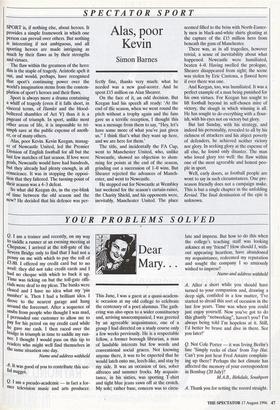SPECTATOR SPORT
Alas, poor Kevin
Simon Barnes
SPORT is, if nothing else, about heroes. It provides a simple framework in which one person can prevail over others. But nothing is interesting if not ambiguous, and all sporting heroes are made intriguing as much by their flaws as by their strengths and virtues.
The flaw within the greatness of the hero: this is the staple of tragedy. Aristotle spelt it out, and would, perhaps, have recognised that sport's continuing power over the world's imagination stems from the contem- plation of sport's heroes and their flaws. Sport is always more a drama containing a whiff of tragedy (even if it falls short, in visceral terms, of Hamlet and the blood- boltered shambles of Act V) than it is a Pageant of triumph. In sport, unlike most other areas of life, it is impossible to tri- umph save at the public expense of anoth- er, or of many others.
Alas, poor Kevin. Kevin Keegan, manag- er of Newcastle United, led the Premier Division of English football for all but the last few matches of last season. If love were goals, Newcastle would have had hundreds, but they already had plenty enough, in all conscience. It was in stopping the, opposi- tion that they faltered. The turning-point of their season was a 4-3 defeat.
So what did Keegan do, in the eye-blink of time between the old season and the new? He decided that his defence was per- fectly fine, thanks very much: what he needed was a new goal-scorer. And he spent £15 million on Alan Shearer.
On the face of it, an odd decision. But Keegan had his speech all ready: 'At the end of the season, when we went round the pitch without a trophy again and the fans gave us a terrific reception, I thought this was a message from them to say, "Hey, let's have some more of what you've just given us." I think that's what they want up here, and we are here for them.'
The title, and incidentally the FA Cup, went to Manchester United, who, unlike Newcastle, showed no objection to slum- ming for points at the end of the season, grinding out a succession of 1-0 wins. But Shearer rejected the advances of Manch- ester, and went to Newcastle. .
He stepped out for Newcastle at Wembley last weekend for the season's curtain-raiser, the Charity Shield, and his opponents were, inevitably, Manchester United. The place seemed filled to the brim with North-Easter- ly men in black-and-white shirts gloating at the capture of the £15 million hero from beneath the guns of Manchester.
There was, as in all tragedies, however trivial, a sense of inevitability about what happened. Newcastle were humiliated, beaten 4-0. Having swelled the prologue, Shearer disappeared from sight; the scene was stolen by Eric Cantons, a flawed hero if ever there was one.
And Keegan, too, was humiliated. It was a perfect example of a man being punished for his own virtues. For Keegan has sought to lift football beyond its self-chosen mire of victory, the slough in which winning is all. He has sought to do everything with a flour- ish, with his eyes not on victory but glory. But last Sunday, with his strategy, and indeed his personality, revealed to all by his richness of attackers and his abject poverty of defenders, he achieved neither victory nor glory. In seeking glory at the expense of all else, he found only disaster. The man who loved glory too well: the flaw within one of the most agreeable and honest peo- ple in sport.
Well, early doors, as football people are wont to say in such circumstances. One pre- season friendly does not a campaign make. This is but a single chapter in the unfolding Keviad. The final destination of the epic is unknown.


















































 Previous page
Previous page